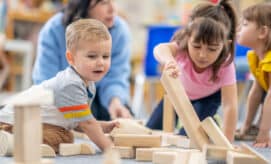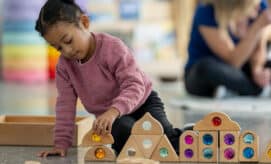During the first years of life, children’s brains make rapid neural connections that equip them to discover the world around them, develop a sense of identity, and learn how to learn. As early learning providers, we can help the little ones in our care during their early years by encouraging them to approach new experiences with a growth mindset, so that they feel confident in their ability to understand new concepts and try new skills. With a growth mindset, children are able to enjoy the process of learning, an attitude that sets them up for success in school and in life.
An Introduction to Growth Mindset
Individuals with a growth mindset believe that through practice and effort they are capable of learning new things and conquering new challenges. They understand that intelligence and abilities are developed over time, and this motivates them to enjoy the process of trying and learning new skills, even those they aren’t able to use just yet.
The term growth mindset was initially introduced by Carol Dweck, a professor of psychology at Stanford University who authored the book, Mindset: A New Psychology of Success. Dr. Dweck discovered the importance of mindset when she was studying pathways to academic success in students. In an article for Education Week, Dweck explained her findings: “We found that students’ mindsets—how they perceive their abilities—played a key role in their motivation and achievement…More precisely, students who believed their intelligence could be developed (a growth mindset) outperformed those who believed their intelligence was fixed (a fixed mindset).”
Growth Mindset in Early Childhood
Young children have a natural curiosity and interest in learning about themselves and the world around them. This motivates them to explore new things and provides them with the determination to try again when they fail.
Lynn DeVries, an educator from the University of Nebraska’s Early Childhood Program, writes that: “Young children naturally lean toward the growth mindset as they are curious about their environment and explore and learn through all of their senses. They learn through trial and error, and incidentally as well as through modeling and teaching.”
As early childhood educators, we can foster early development of a growth mindset by building upon children’s positive inclination towards trying new things, and by offering them opportunities to take on new challenges.
Tips for Educators to Encourage Growth Mindset in Early Learners
Praise with Intention
The language we use with children in our care can have a significant impact on the way that they view themselves. To create a positive environment and encourage a growth mindset, it is important to praise children for their efforts, rather than for the final product of their work.
For example, if a child finishes an art project, you might say something like, “Wow! I noticed how much work you put into creating such a lovely picture. I really like the way you chose to use so many different colors!” This kind of praise acknowledges children’s hard work, and encourages them to continue to put forth their best effort in the future. It helps them know that their initiative and effort are seen and valued, and that their hard work pays off!
Model Trying New Things
Children learn so much by observing the grown-ups in their lives who they trust and look up to. When they see us trying new things, it gives shows them the self-confidence to take on similar challenges. For example, if you are having a snack or meal with the children in your care that includes a new type of food, you might say something like, “Hmm… I’ve never tasted this vegetable before, but I’m going to be brave and give it a try!”
Tap into the Power of “Yet”
When children in our care say that they can’t do something, we can help reframe their outlook by adding the word “yet,” to the end of their sentence as a helpful reminder that we can do all things with practice and effort!
An article from the American Montessori Society describes the benefits of the word “yet”: “‘Yet.’ It is such a small, but powerful word. ‘I am not able to read… yet.’…Helping children adopt a growth mindset that includes the concept of ‘yet’ allows them to shift to a more positive perspective and outlook on life, empowering them to reach their fullest potential.”
You can reinforce growth mindset conversations with young children by using the word “yet” to transform frustration into a sense of possibility, and by sharing children’s books that highlight the power of the word “yet,” such as Y Is for Yet: A Growth Mindset Alphabet and The Magical Yet.
Normalize Making Mistakes
We want the little ones in our care to be resilient enough to pick themselves up and try again when they don’t succeed the first time. To do so, we have to help them learn that making mistakes is an important part of the learning process! Rather than being something to be ashamed of, or a sign of failure, mistakes are an opportunity to try again.
The way you respond to a child’s efforts offers them a way to practice reframing their mistakes. For example, you might make an observation such as “I saw you fall down from your bicycle but I am so proud of how you got up and tried to ride it again. That’s how we learn!” You can also model a growth mindset approach by letting children know when you’ve made a mistake, by saying something like, “Oops, I forgot to bring our water bottles outside with us today. That’s okay! Accidents happen. I’ll go grab them now, and try to remember them next time.”





